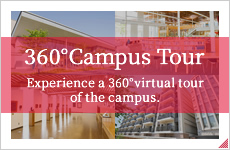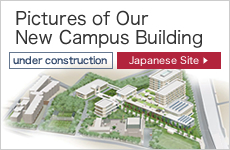Experiential Learning

- Enhancing hands-on education programs such as overseas field experience, internships and service learning.
- Encourage and support voluntary social contribution activities by students in cooperation with companies, NPOs and public institutions.
Actively utilizing educational resources from outside the university, experiential learning programs in Japan and overseas are implemented which incorporate specific themes and cultivate the (students’) ability to adapt to society.
These experiential learning programs are provided to study up-to-date issues, for example, about environmental or food problems in Asia, at governmental institutions or NGOs. Students learn practical abilities to meet the challenges through their experiences in Japan and overseas.
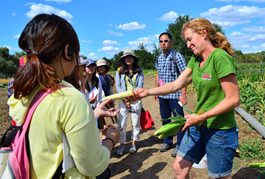
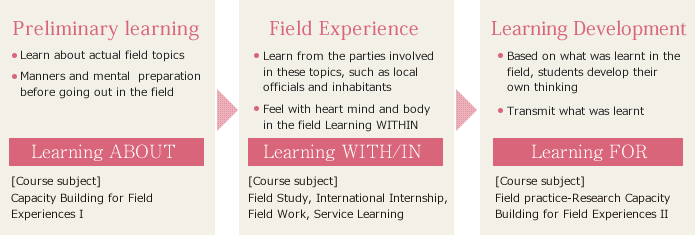
Program Introduction
Overseas Program
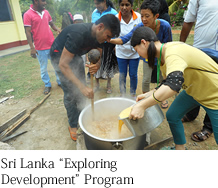
Through field experience, students deepen their understanding of the topics they studied about in the course Field practice-Research Implementation Theory I. At the same time, in order to build up the students’ own active pursuit of learning in the field along with others, we aim to cultivate communication skills and self-management skills, set-up and adjustment capability as well as adaptability. In addition, the on-site social manners required to learn from the parties and practitioners involved, as well as the skills to listen, inquire, empathize and imagine are fostered and connected with what is studied in the course Field practice-Research Implementation Theory II.
【EAT】
A 2-week program about the food cultures of Asia. In addition to lectures on food, students visit food factories and try actual cooking to learn about Asian food cultures. The 2015 program (Heisei 27) was held in Thailand at Mahidol University and FWU. All lectures are taught in English.
【Our Food and Environment in the Globalized World (USA, UC Davis)】
Learn about the US food and environment in this approximately 2-week program of language study, lectures and site visits. The 2015 (Heisei 27) program focused on the environment and students learnt about citizen initiatives for environmental problems in the USA and their solutions. Visit destinations include recycling facilities, eco-village, organic farm and National Park. It should be noted that in AY 2016 (Heisei 28) the program will focus on food. Students will visit hospitals and geriatric facilities where registered dietitians are active and they will learn about their role and teaching methods. While visiting, students do a homestay and sense the eating habits of US families.
【Sri Lanka Exploring “Development” Program]】
Students learn the historical transition of international development cooperation and express and shape their own stance about the role of “International Development Cooperation” (IDC) in the ongoing globalization.
Programs in Japan
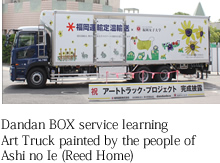
Art Truck painted by the people of Ashi no Ie (Reed Home)
Students set up topics related to “globalization” and carry out internships. The proposals for the resolutions of these set problems are transmitted through written reports and debriefing meetings. This, along with the deepening of the expertise on the subject, aims to foster skills of communication, self-management, planning and problem-solving. By learning about real social issues through work-related experience, students cherish fostering an outside-the-box pluralistic viewpoint and employment outlook.
【Kashii Urban Development Service Learning】
Through regional vitalization events such as the Kashii-hama fireworks and NPO cooperation responsible for Kashii urban development, students get to know “urban development” jobs and location and contribute to solving problems in the town planning of Kashii.
【Café/Walk Route Service Learning】
The management of the community café is carried out inside the independence support center for the poor and needy called Houbokukan Fukuoka (NPO Green Coop). These “roots” are to build independent community life in order (for locals) to avoid becoming “isolated”.
【Community Vitalization Co-Housing Project Service Learning】
A co-housing project for solving problems such as aging and child-rearing issues at the Kashii Wakaba complex. Surveys (interview and questionnaire), planning development and implementation are carried out for problem solving purposes.
【Junior High School Learning Support Service Learning】
For the purpose of “learning through teaching”, support activities of after-school learning are carried out at Joukou JHS in the vicinity of FWU. Students learn about the difficulties and joys of building a relationship of trust with the JHS students.
【Dandan BOX Service Learning】
Through the support of the artistic activities of the people at Ashi no Ie, a facility for people with intellectual disabilities, students experience proactive learning.
【Fukutsu City Service Learning】
Students contribute to regional promotion and local construction by coordinating and planning together with Fukutsu City staff and citizens a Fukutsu citizen course about regional development.

